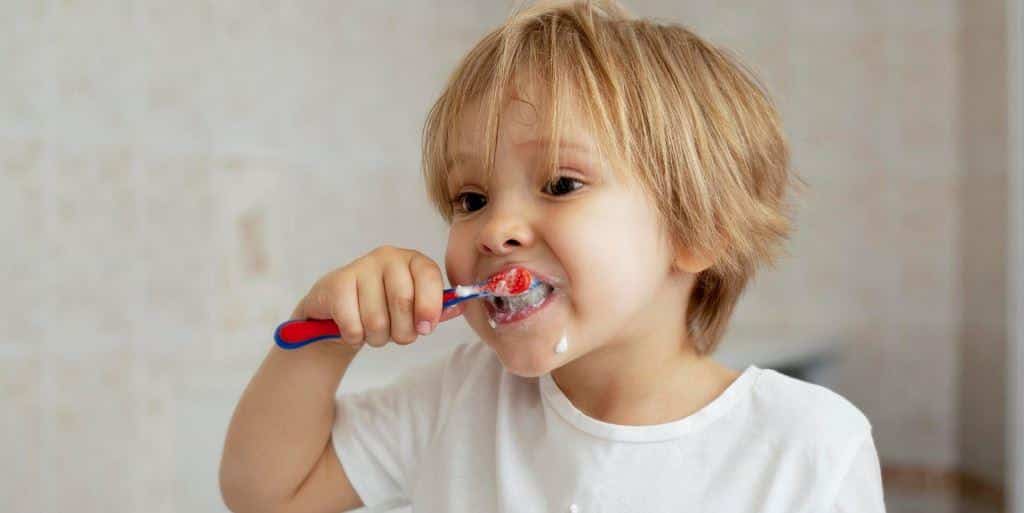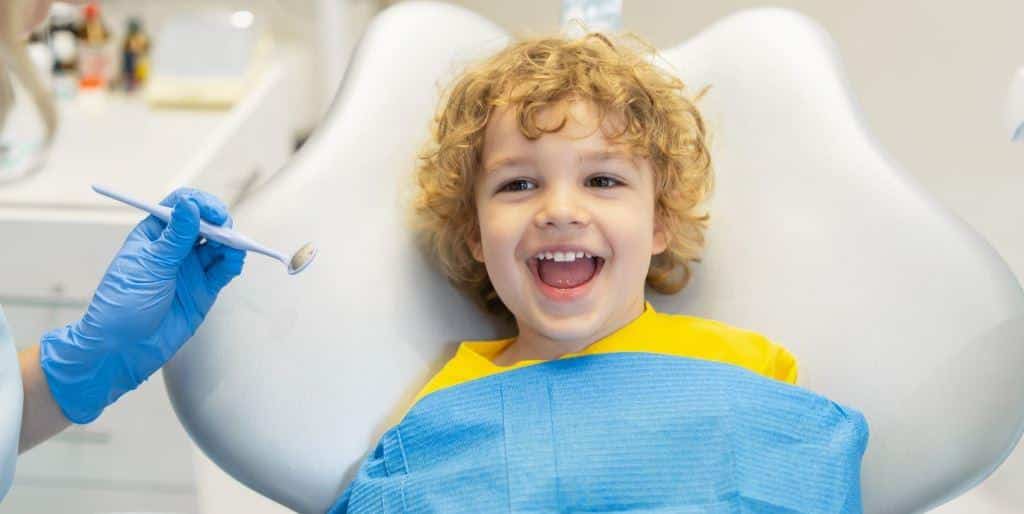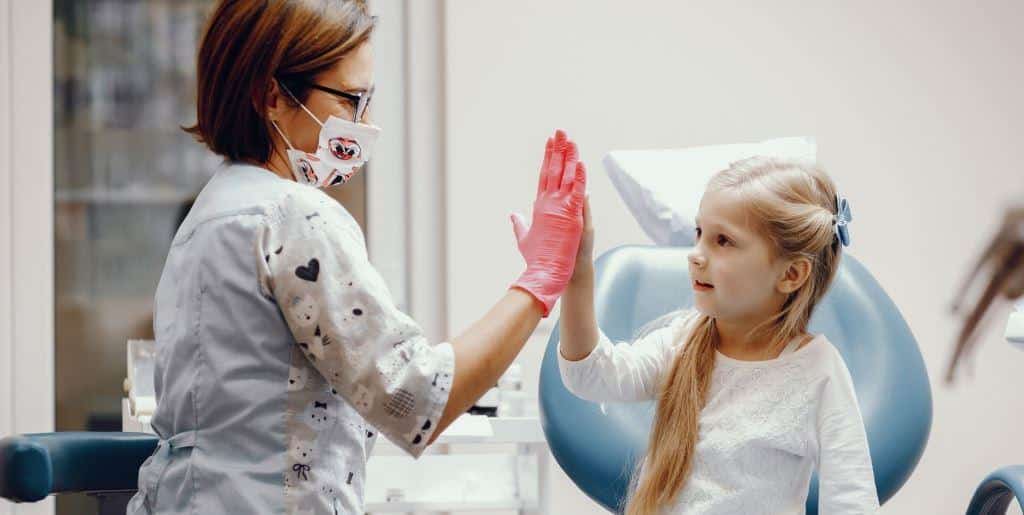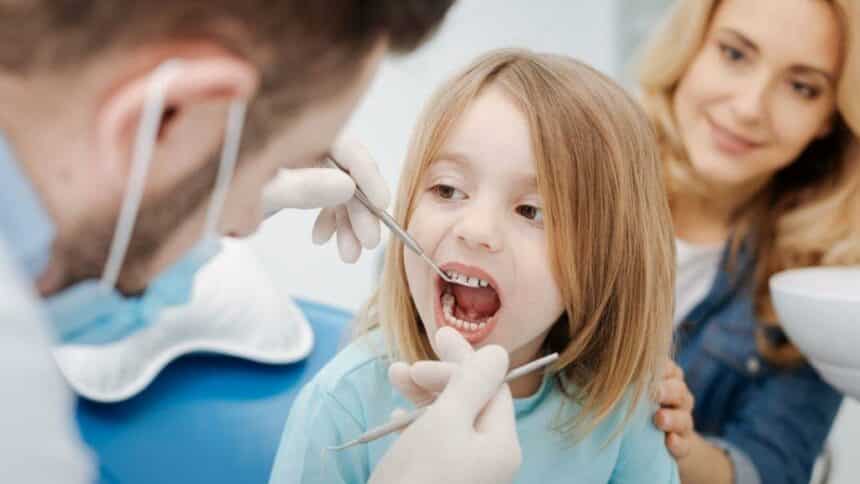Pain, sleep and speech problems, plus malocclusion and crooked teeth in the future. These are among the many consequences for a child who has damaged milk teeth. Therefore, there is only one answer to the question whether treatment of milk teeth makes sense - YES. And why - you will find out in our article.
Baby teeth are just as important as permanent teeth
Unfortunately, there is still a belief that milk teeth will fall out and are not worth treating, thus saving the child pain at the dentist. The opposite is true, negligence from childhood have their very serious consequences.
The first of these is caries. This in the case of children develops very quickly. There are several reasons for this, but the most common are inaccurate tooth brushing and plaque build-up. Children are also more likely to reach for sweets, which damage the teeth. Importantly, deciduous teeth are much less mineralised than permanent teeth and therefore decay more quickly. You can read more about caries itself in our article "Child caries - causes, symptoms and treatment".
Another consequence of not treating deciduous teeth is that they need to be extracted. The millipedes should fall out on their own, "pushed" by the permanent teeth. However, what if they are removed early? Firstly, it is a pain and stress for the child that could have been avoided. Secondly, a high risk of malocclusion and the need for orthodontic treatment in the future. However, there may be times when extraction is the right decision - when? You can find out in our article "Extraction of a deciduous tooth when it is necessary".
Finally, there are unrelated consequences directly with health. A child who has damaged milk teeth may have a problem with biting and chewing, which affects the whole digestive system. I may also have a problem with pronunciation or reduced self-esteem.

Treatment of deciduous teeth starts with prevention
Seemingly obvious, but many parents forget this, or limit themselves to saying to their child "go brush your teeth". This is far too little! Let's start from the beginning.
Caring for your child's milk teeth should start with from the moment the baby is born. Even then, his gums should be washed to remove food residues and bacteria.
When the first tooth appears, the first visit to the dentist should take place. This is an excellent opportunity to familiarise the child with the dentist's surgery and not to associate it with pain. You can read more about what such an adaptation visit looks like in our article "Your child's first visit to the dentist in the UK".
The next ones should take place every six months. In this way, the dentist is able to spot changes at an early stage and start treating your child's milk teeth straight away. He or she can also carry out one of the treatments to protect the deciduous teeth from decay and make them more resistant to bacteria. You can read more about this in our article "Preventive treatments for your child - or how to keep your little one's teeth healthy".
Finally, daily oral hygiene. Remember that brushing the teeth twice a day is a minimum. It is advisable to teach your child to floss at the very beginning, so that he or she develops a habit that can protect him or her from periodontitis, among other diseases.
Children do not always set an example when it comes to brushing their teeth, That is why it is best to do it together at first. And if your little one finds oral hygiene a torment, we recommend our text "10 ways to encourage your child to brush their teeth".

What is the treatment of deciduous teeth?
In addition to these preventive treatments, your little one's teeth may also need dental treatment. What does this involve?
In principle, the treatment of deciduous teeth is no different from the treatment of permanent teeth. Depending on the needs of the young patient, ozone treatment may be ordered (for small cavities) or the tooth is cleaned and a filling placed. If the carious lesions reach the pulp, which is associated with a lot of pain, the entire procedure is carried out under local anaesthesia.
And if your little one is afraid of the treatment of deciduous teeth and the dentist's surgery makes him or her shudder, we recommend our text "Fear of the dentist in a child - how to combat it".
As we mentioned it is possible that in some cases extraction will be necessary.
Orthodontic treatment is also worth mentioning. These may be necessary due to negligence in oral hygiene, but malocclusion can also be inherited. Whatever the cause, it is worth consulting an orthodontist and starting possible treatment from an early age. Why and which options can you choose from? Find out in our articles "Crooked teeth in children - causes, prevention and treatment" and "Braces for children - when is it worth thinking about and how much does it cost?".

How much does it cost to treat deciduous teeth?
Of course, prevention will always be cheaper than treating milk teeth. You will save not only money, but time for subsequent visits and, most importantly, pain for your child.
Preventive treatments such as tooth varnishing, Fluoridisation is an expense of £40 per arch and sealants £50 per tooth. Filling and extraction is £60 per treatment, the price of removable braces starts at £300 per arch.
If you would like to find out more please visit contact. At the same time, we would like to remind you that you can take advantage of our instalment scheme for treatment over £350. You can read more about it in our article "Teeth on credit, or dental treatment by instalments". Importantly, the first 12 months are zero interest, thus you only pay back the amount you have spent. The instalment scheme is safe and regulated by the Financial Conduct Authority (FCA number: 619628).

